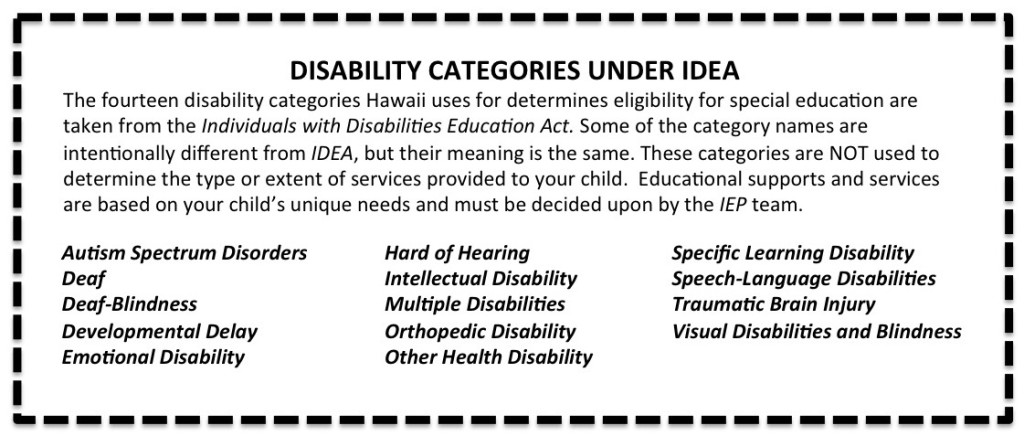An eligibility meeting is held when the evaluation process is complete.
The purpose of this meeting is to discuss the results of the evaluation process, including test results and state assessment data, and decide if your child is eligible to receive special education and related services.
Eligibility for children in early intervention programs is made
by age 3.
by age 3.
Eligibility for Part C (early intervention) services under IDEA end at age three, so early intervention programs and schools work together to ensure that the young child’s evaluation and eligibility is determined by his or her third birthday. Usually the eligibility process begins 90-120 days before the child turns three.
In order to be eligible, a student
must meet three requirements.
must meet three requirements.
First, he or she must meet the definition of a “student with a disability” under one of the 14 disability categories for Chapter 60 (see box below). Secondly, the disability must have a negative effect on the student’s involvement and progress in regular education. Lastly, because of this disability, the student must need special education and related services in order to learn.
The child or young adult must also
be between the ages of 3 and 22.
be between the ages of 3 and 22.
Any student who is 3 through 21 may qualify for special education, if it is determined that he or she needs specially designed instruction in order to benefit from education. Eligibility ends when the student no longer needs special education services OR the day before a student’s 22nd birthday OR upon graduation with a regular diploma.
A lack of schooling or difficulties
with English do not necessarily qualify a child for special
education.
with English do not necessarily qualify a child for special
education.
A student may not be identified as having a disability, if he or she is doing poorly in school just because he or she does not speak or understand English well. Likewise, a student who has not had appropriate instruction in math or reading will not be seen as a child with a disability, if he or she does not otherwise meet the eligibility requirements. In determining whether a student received appropriate instruction in reading and math, the eligibility team considers the student’s attendance, as well as the evidence-based instruction that was provided and any targeted interventions and their results.
If your child is found eligible, your consent is needed before an IEP is held.
By consenting to the initial provision of services, you are agreeing to continue the process of finding the appropriate services to meet your child’s needs. By law, the IEP meeting must occur within 30 days of finding your child eligible, and once you sign consent, it typically convenes within fifteen days.
If your child is NOT found eligible,
you may consider other options.
you may consider other options.
If you disagree with the determination that your child is not eligible, you can request an Independent Educational Evaluation (as discussed in EVALUATION). You may also request mediation or a due process hearing (see DUE PROCESS). The team should discuss how the school plans to help your child with learning difficulties.

For definitions of each disability category see WORDS TO KNOW.




